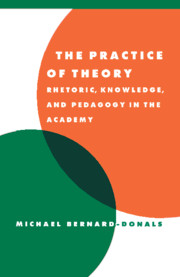Book contents
- Frontmatter
- Contents
- Acknowledgments
- Introduction
- 1 Reconsidering Gorgias, Phaedrus, and Platonic rhetoric
- 2 Why Aristotle's notion of rhetoric and science is important for contemporary critical practice
- 3 A (rhetorical) reading of the human sciences: toward antifoundationalism
- 4 Rorty and the mirror of nature: hermeneutics and the possibility of social change
- 5 Louise Phelps and Theory: toward a human science disciplined by practical wisdom
- 6 Liberatory pedagogy, conceptual knowledge: toward a practical wisdom disciplined by scientific observation
- 7 Toward a materialist rhetoric: writing the conditions of the incommensurable
- Works cited
- Index
6 - Liberatory pedagogy, conceptual knowledge: toward a practical wisdom disciplined by scientific observation
Published online by Cambridge University Press: 04 August 2010
- Frontmatter
- Contents
- Acknowledgments
- Introduction
- 1 Reconsidering Gorgias, Phaedrus, and Platonic rhetoric
- 2 Why Aristotle's notion of rhetoric and science is important for contemporary critical practice
- 3 A (rhetorical) reading of the human sciences: toward antifoundationalism
- 4 Rorty and the mirror of nature: hermeneutics and the possibility of social change
- 5 Louise Phelps and Theory: toward a human science disciplined by practical wisdom
- 6 Liberatory pedagogy, conceptual knowledge: toward a practical wisdom disciplined by scientific observation
- 7 Toward a materialist rhetoric: writing the conditions of the incommensurable
- Works cited
- Index
Summary
If it is true that the “rhetorical turn” in the human sciences begun around thirty years ago, based on the work of Dilthey, Gadamer and others and popularized in the American academy by the likes of Thomas Kuhn in science and Richard Rorty in philosophy, was something like a quiet revolution that upended once and for all the superiority of science and forced the scientific disciplines to note how they functioned rhetorically, then the last ten years have seen what might modestly be called a counter-revolution. Where the revolution was marked – by those working in rhetoric especially with something like glee – with announcements that the “sciences of the text,” like formalism, New Criticism, structuralism and most Marxisms were shown once and for all to be failures because science's claim to special objective status was a false one, the counter-revolution has been marked with cautious reminders that description and observation – though perhaps just as biassed as some of Kuhn's more vocal adherents would suggest – nevertheless cannot be dispensed with even in the most hermeneutical of textual practices. Where the revolution has come close at times to suggesting that the operations of science, because they overlap with interpretation, must ultimately be subsumed by hermeneutics, the counter-revolution has suggested often mutedly, though sometimes stridently, that interaction and not subsumption is what the overlapping of the rhetorical and scientific realms suggests for the work of both the human and the natural sciences.
- Type
- Chapter
- Information
- The Practice of TheoryRhetoric, Knowledge, and Pedagogy in the Academy, pp. 161 - 212Publisher: Cambridge University PressPrint publication year: 1998

